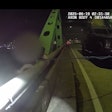A police officer may lie to a suspect regarding the reason for a traffic stop, even when no traffic violation was committed, if it's part of an unrelated criminal investigation, the Ninth Circuit Court of Appeals said in a ruling issued Thursday, reports the Yakima Herald-Republic.
The case, which originated in federal court in Montana, involved two men accused of transporting methamphetamine from the Yakima Valley in Washington to Minnesota.
Hector Magallon-Lopez argued that his right to be free from unreasonable search or seizure was violated when an officer told him he’d been stopped for changing lanes without signaling. He asked that evidence be suppressed because of the supposed violation.
A federal district judge in Montana had rejected his argument, prompting the appeal.
The appeals court ruled that the misleading statements were allowable as long as an officer has sufficient evidence to support the underlying investigation.
In this case, a Drug Enforcement Administration task force had developed information through wire-tapped conversations about a drug conspiracy.
Investigators ultimately detained Magallon-Lopez and his co-defendant and discovered two pounds of methamphetamine in the car. Both are expected to be deported upon completion of their 10- and 12-year prison sentences.














